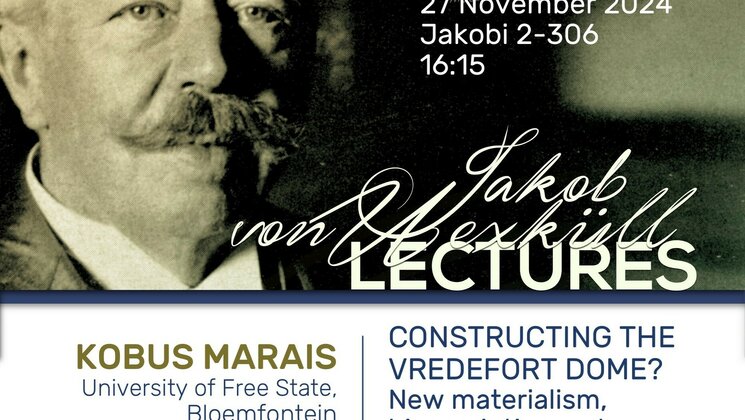-
Faculty of Arts and HumanitiesDean's Office, Faculty of Arts and HumanitiesJakobi 2, r 116-121 51005 Tartu linn, Tartu linn, Tartumaa EST0Institute of History and ArchaeologyJakobi 2 51005 Tartu linn, Tartu linn, Tartumaa EST0Institute of Estonian and General LinguisticsJakobi 2, IV korrus 51005 Tartu linn, Tartu linn, Tartumaa EST0Institute of Philosophy and SemioticsJakobi 2, III korrus, ruumid 302-337 51005 Tartu linn, Tartu linn, Tartumaa EST0Institute of Cultural ResearchÜlikooli 16 51003 Tartu linn, Tartu linn, Tartumaa EST0Institute of Foreign Languages and CulturesLossi 3 51003 Tartu linn, Tartu linn, Tartumaa EST0School of Theology and Religious StudiesÜlikooli 18 50090 Tartu linn, Tartu linn, Tartumaa EST0Viljandi Culture AcademyPosti 1 71004 Viljandi linn, Viljandimaa EST0Professors emeriti, Faculty of Arts and Humanities0Associate Professors emeriti, Faculty of Arts and Humanities0Faculty of Social SciencesDean's Office, Faculty of Social SciencesLossi 36 51003 Tartu linn, Tartu linn, Tartumaa EST0Institute of EducationJakobi 5 51005 Tartu linn, Tartu linn, Tartumaa EST0Johan Skytte Institute of Political StudiesLossi 36, ruum 301 51003 Tartu linn, Tartu linn, Tartumaa EST0School of Economics and Business AdministrationNarva mnt 18 51009 Tartu linn, Tartu linn, Tartumaa EST0Institute of PsychologyNäituse 2 50409 Tartu linn, Tartu linn, Tartumaa EST0School of LawNäituse 20 - 324 50409 Tartu linn, Tartu linn, Tartumaa EST0Institute of Social StudiesLossi 36 51003 Tartu linn, Tartu linn, Tartumaa EST0Narva CollegeRaekoja plats 2 20307 Narva linn, Ida-Virumaa EST0Pärnu CollegeRingi 35 80012 Pärnu linn, Pärnu linn, Pärnumaa EST0Professors emeriti, Faculty of Social Sciences0Associate Professors emeriti, Faculty of Social Sciences0Faculty of MedicineDean's Office, Faculty of MedicineRavila 19 50411 Tartu linn, Tartu linn, Tartumaa ESTInstitute of Biomedicine and Translational MedicineBiomeedikum, Ravila 19 50411 Tartu linn, Tartu linn, Tartumaa ESTInstitute of PharmacyNooruse 1 50411 Tartu linn, Tartu linn, Tartumaa ESTInstitute of DentistryL. Puusepa 1a 50406 Tartu linn, Tartu linn, Tartumaa ESTInstitute of Clinical MedicineL. Puusepa 8 50406 Tartu linn, Tartu linn, Tartumaa ESTInstitute of Family Medicine and Public HealthRavila 19 50411 Tartu linn, Tartu linn, Tartumaa ESTInstitute of Sport Sciences and PhysiotherapyUjula 4 51008 Tartu linn, Tartu linn, Tartumaa ESTProfessors emeriti, Faculty of Medicine0Associate Professors emeriti, Faculty of Medicine0Faculty of Science and TechnologyDean's Office, Faculty of Science and TechnologyVanemuise 46 - 208 51003 Tartu linn, Tartu linn, Tartumaa ESTInstitute of Computer ScienceNarva mnt 18 51009 Tartu linn, Tartu linn, Tartumaa ESTInstitute of GenomicsRiia 23b/2 51010 Tartu linn, Tartu linn, Tartumaa ESTEstonian Marine Institute0Institute of PhysicsInstitute of ChemistryRavila 14a 50411 Tartu linn, Tartu linn, Tartumaa EST0Institute of Mathematics and StatisticsNarva mnt 18 51009 Tartu linn, Tartu linn, Tartumaa EST0Institute of Molecular and Cell BiologyRiia 23, 23b - 134 51010 Tartu linn, Tartu linn, Tartumaa ESTTartu ObservatoryObservatooriumi 1 61602 Tõravere alevik, Nõo vald, Tartumaa EST0Institute of TechnologyNooruse 1 50411 Tartu linn, Tartu linn, Tartumaa ESTInstitute of Ecology and Earth SciencesJ. Liivi tn 2 50409 Tartu linn, Tartu linn, Tartumaa ESTProfessors emeriti, Faculty of Science and Technology0Associate Professors emeriti, Faculty of Science and Technology0Institute of BioengineeringArea of Academic SecretaryHuman Resources OfficeUppsala 6, Lossi 36 51003 Tartu linn, Tartu linn, Tartumaa EST0Area of Head of FinanceFinance Office0Area of Director of AdministrationInformation Technology Office0Administrative OfficeÜlikooli 17 (III korrus) 51005 Tartu linn, Tartu linn, Tartumaa EST0Estates Office0Marketing and Communication OfficeÜlikooli 18, ruumid 102, 104, 209, 210 50090 Tartu linn, Tartu linn, Tartumaa EST0Area of Vice Rector for DevelopmentCentre for Entrepreneurship and InnovationNarva mnt 18 51009 Tartu linn, Tartu linn, Tartumaa EST0University of Tartu Natural History Museum and Botanical GardenVanemuise 46 51003 Tartu linn, Tartu linn, Tartumaa EST0International Cooperation and Protocol Office0University of Tartu MuseumLossi 25 51003 Tartu linn, Tartu linn, Tartumaa EST0Area of RectorRector's Strategy OfficeInternal Audit OfficeArea of Vice Rector for Academic AffairsOffice of Academic Affairs0University of Tartu Youth AcademyUppsala 10 51003 Tartu linn, Tartu linn, Tartumaa EST0Student Union OfficeÜlikooli 18b 51005 Tartu linn, Tartu linn, Tartumaa EST0Centre for Learning and TeachingArea of Vice Rector for ResearchUniversity of Tartu LibraryW. Struve 1 50091 Tartu linn, Tartu linn, Tartumaa EST0Grant Office
Public Lectures by Robert Rosenberger on Philosophy of Technology


September 4th—6th, Associate Professor Robert Rosenberger from the Georgia Institute of Technology will give three public lectures on philosophy of technology.
Place: Jakobi 2-336, Tartu.
- Sept 4 at 17.15—18.45 "The Philosophy of User Interface: On Smartphones and Driver Distraction"
- Sept 5 at 16.15—17.45 "Philosophy of Technology and the Control of Public Space"
- Sept 6 at 16.15—17.45 "How Scientists ‘Read’ Images: The Technological Mediation of the Mars Global Surveyor"
Lectures are part of the workshop Postphenomenology, Technoscience and Hermeneutics.
Everyone is welcome, no pre-registration is needed.
Sept 4 at 17.15—18.45
The Philosophy of User Interface: On Smartphones and Driver Distraction
Smartphone-induced driving impairment is an example of a contemporary problem that results from issues of technological interface. Texting, talking on the phone, and browsing the internet while driving have all been shown to be dangerous activities. It remains an urgent task to figure out how best to raise awareness of these dangers, and how best to convince lawmakers to further restrict these practices. Here, I use the problem of smartphone driving impairment to explore our relationships with technology. In particular, I expand on the “postphenomenological” philosophical perspective to develop an original account of the experience of human-technology interface as it relates to the central technologies of this case: the car and the phone. I argue that a key element of the driver distraction of smartphones is the normalcy of these devices, the saturation of cars and phones in contemporary culture, and the specific bodily-perceptual habits we develop with them. On the one hand, it is important that we become deeply accustomed to the use of our technologies. (E.g., safe driving requires accustomization with the car’s interface). But on the other, these habitual relationships can also at times cause serious problems, with smartphone driving impairment as a key example.
Sept 5 at 16.15—17.45
Philosophy of Technology and the Control of Public Space
The objects of public spaces are often designed with an eye toward controlling how they may be used, affording certain uses and sometimes limiting others. A contemporary discussion is emerging over design trends that unjustly discriminate against vulnerable groups, such as the unhoused. Sometimes referred to as “hostile design,” among other names, critics and researchers are developing tools to identify and analyze these practices. Here, I draw on ideas from the philosophy and sociology of technology to zero in on the politics of hostile design, and to reveal the ways that the design of public-space objects can play into larger hostile agendas. In particular, I utilize ideas from social theory and “postphenomenological” philosophy to articulate the ways that design is used to systematically “close off” particular usages of public space, and to advocate against anti-homeless design.
Sept 6 at 16.15—17.45
How Scientists ‘Read’ Images: The Technological Mediation of the Mars Global Surveyor
Ideas from the phenomenological tradition of philosophy can be used to articulate the kinds of relationships scientists develop with their devices. In particular, a bustling line of work within the “postphenomenological” school of thought explores the nature of image interpretation in science and considers its implications for scientific practice and epistemology. As a key contributor to this line of study, I have focused on the topic of scientific debates over images, exploring what it means for images to be multiply interpretable in ways that make possible debates over their meaning. Here, I present the results of case studies I have conducted into debates in neurobiology over images of the changes to the cell walls of neurons during neurotransmission, as well as images from the Mars Global Surveyor craft whose mapping of the surface of Mars has implications both for Martian climatological history and for the possibility of contemporary water flow on the planet. My contention is that these ideas from the philosophy of technology helpfully draw out how debates over images in science are not merely disagreements over how best to theorize data, but also over how best to perceptually relate to images as concrete laboratory artifacts.
Robert Rosenberger is an Associate Professor of Philosophy in the School of Public Policy at the Georgia Institute of Technology, and he serves as President of the Society for Philosophy and Technology (spt.org). His work advances the “postphenomenological” theoretical perspective. These investigations include studies on the driving impairment of smartphones, frog dissection simulations in the classroom, and the use of imaging technologies in neurobiology and space science. His 2017 book "Callous Objects" uses ideas from the philosophy of technology to criticize the ways that public spaces are built to discriminate against the homeless. Further information about Rosenberger can be found on his website.
Public Lectures by Robert Rosenberger on Philosophy of Technology
Read more similar news





